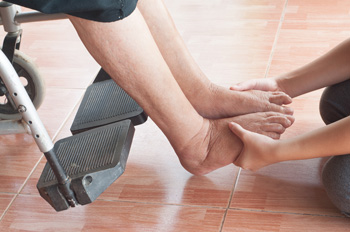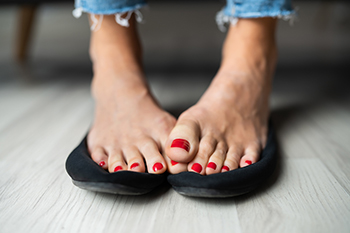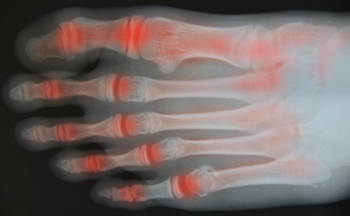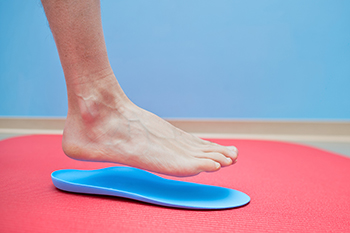Items filtered by date: January 2022
Heel Pain in the Morning?
Solutions for Sweaty Feet
Do you regularly soak through your socks and shoes, regardless of the weather? Are you worried about leaving behind wet footprints when you walk around barefoot? Excessively sweaty feet may be a sign of a condition called plantar hyperhidrosis. In addition to being potentially embarrassing, this condition also increases your risk of various foot problems, such as fungal infections and injuries due to your feet slipping as you walk. Fortunately, various treatments are available for plantar hyperhidrosis. These include topical antiperspirants, iontophoresis, and botox injections into the foot. There are also special powders and shoe inserts that you can wear to absorb excess moisture. To learn more about treatments for plantar hyperhidrosis, and to find the right one for you, it’s suggested that you consult with a podiatrist.
If you are suffering from hyperhidrosis contact Cory Brown, DPM of Cory Brown, DPM. Our doctor can provide the care you need to attend to all of your foot and ankle needs.
Hyperhidrosis of the Feet
Hyperhidrosis is a rare disorder that can cause people to have excessive sweating of their feet. This can usually occur all on its own without rigorous activity involved. People who suffer from hyperhidrosis may also experience sweaty palms.
Although it is said that sweating is a healthy process meant to cool down the body temperature and to maintain a proper internal temperature, hyperhidrosis may prove to be a huge hindrance on a person’s everyday life.
Plantar hyperhidrosis is considered to be the main form of hyperhidrosis. Secondary hyperhidrosis can refer to sweating that occurs in areas other than the feet or hands and armpits. Often this may be a sign of it being related to another medical condition such as menopause, hyperthyroidism and even Parkinson’s disease.
In order to alleviate this condition, it is important to see your doctor so that they may prescribe the necessary medications so that you can begin to live a normal life again. If this is left untreated, it is said that it will persist throughout an individual’s life.
A last resort approach would be surgery, but it is best to speak with your doctor to find out what may be the best treatment for you.
If you have any questions please feel free to contact our office located in Lewiston, ID . We offer the newest diagnostic and treatment technologies for all your foot and ankle needs.
When Rheumatoid Arthritis Affects the Ankles
The synovial membrane is the protective tissue that surrounds joints such as the ankle. Rheumatoid arthritis is an auto-immune disease in which the body attacks this tissue causing it to become swollen and filled with fluid. Over time, this fluid can break the ankle joint down, causing it to become misaligned, deformed, and stiff. Other symptoms include ankle pain, fatigue, and fever. If the inflammation of rheumatoid arthritis goes unchecked, it may affect other parts of the body and lead to other diseases. While genetics can make you more predisposed to infections that may bring on rheumatoid arthritis, smoking, old age, and obesity may also increase your risks of contracting this disease. If you have pain in your ankles due to rheumatoid arthritis, a podiatrist may treat you with medications, physical therapy, orthotics, steroid injections or, in worst case scenarios, surgery to increase stability, reduce pain, and restore mobility in the ankles.
Because RA affects more than just your joints, including the joints in your feet and ankles, it is important to seek early diagnosis from your podiatrist if you feel like the pain in your feet might be caused by RA. For more information, contact Cory Brown, DPM of Cory Brown, DPM. Our doctor will assist you with all of your podiatric concerns.
What Is Rheumatoid Arthritis?
Rheumatoid Arthritis (RA) is an autoimmune disorder in which the body’s own immune system attacks the membranes surrounding the joints. Inflammation of the lining and eventually the destruction of the joint’s cartilage and bone occur, causing severe pain and immobility.
Rheumatoid Arthritis of the Feet
Although RA usually attacks multiple bones and joints throughout the entire body, almost 90 percent of cases result in pain in the foot or ankle area.
Symptoms
- Swelling and pain in the feet
- Stiffness in the feet
- Pain on the ball or sole of feet
- Joint shift and deformation
Diagnosis
Quick diagnosis of RA in the feet is important so that the podiatrist can treat the area effectively. Your doctor will ask you about your medical history, occupation, and lifestyle to determine the origin of the condition. Rheumatoid Factor tests help to determine if someone is affected by the disease.
If you have any questions please feel free to contact our office located in Lewiston, ID . We offer the newest diagnostic and treatment technologies for all your foot and ankle needs.
What Can Custom Orthotics Do for My Foot Condition?
Custom orthotics are prescription devices that fit in shoes and are designed to distribute weight more evenly across the feet and minimize pressure on any given area. They can also correct an abnormal gait, reduce pain, and improve foot alignment. Since they are designed to address specific conditions and the individual foot structure of the patient, fit is critical. After a podiatrist examines the patient and diagnoses their underlying condition, they may determine that orthotics can be beneficial. They will then take an impression of the patient’s foot, usually with a 3D laser scan or plaster cast. Specific materials will be chosen to address the patient’s particular condition, and the orthotic will be created. The patient will come in for a fitting and any further customizations needed to ensure the device fits the patient’s shoes and is comfortable will be made. Orthotics can be prescribed for conditions such as arthritis, plantar fasciitis, heel spurs, bunions, hammertoes, flat feet, high arches and more. If you have any of these conditions, it is suggested that you make an appointment with a podiatrist to see if orthotics may be beneficial for you.
If you are having discomfort in your feet and would like to try orthotics, contact Cory Brown, DPM from Cory Brown, DPM. Our doctor can provide the care you need to keep you pain-free and on your feet.
What Are Orthotics?
Orthotics are inserts you can place into your shoes to help with a variety of foot problems such as flat feet or foot pain. Orthotics provide relief and comfort for minor foot and heel pain but can’t correct serious biomechanical problems in your feet.
Over-the-Counter Inserts
Orthotics come in a wide variety of over-the-counter inserts that are used to treat foot pain, heel pain, and minor problems. For example, arch supports can be inserted into your shoes to help correct overarched or flat feet, while gel insoles are often used because they provide comfort and relief from foot and heel pain by alleviating pressure.
Prescription Orthotics
If over-the-counter inserts don’t work for you or if you have a more severe foot concern, it is possible to have your podiatrist prescribe custom orthotics. These high-quality inserts are designed to treat problems such as abnormal motion, plantar fasciitis, and severe forms of heel pain. They can even be used to help patients suffering from diabetes by treating foot ulcers and painful calluses and are usually molded to your feet individually, which allows them to provide full support and comfort.
If you are experiencing minor to severe foot or heel pain, it’s recommended to speak with your podiatrist about the possibilities of using orthotics. A podiatrist can determine which type of orthotic is right for you and allow you to take the first steps towards being pain-free.
If you have any questions please contact our office located in Lewiston, ID . We offer the newest diagnostic and treatment technologies for all your foot and ankle needs.
Ways Seniors Can Maximize Foot Care
 As one ages, it becomes harder to reach down to the toes and keep toenails trimmed properly. In some cases, just gripping the clippers is difficult, if not impossible. At the same time, toenail growth decreases with age, resulting in thicker nails that are more difficult to trim. One way to soften the thicker nails and make them easier to cut is by soaking the feet for about 10 minutes in warm water. Thoroughly dry the feet, and use a clipper to make small cuts straight across the nail to lessen the chance of an ingrown toenail. If your toenails have both hardened and become discolored, you may also have developed a fungal infection. Such a condition can worsen rapidly and become painful. For that reason, it would be wise to contact a podiatrist immediately, as fungal infections may take months to eliminate. It is also suggested that seniors make regular appointments with a podiatrist for proper foot-care treatment as needed.
As one ages, it becomes harder to reach down to the toes and keep toenails trimmed properly. In some cases, just gripping the clippers is difficult, if not impossible. At the same time, toenail growth decreases with age, resulting in thicker nails that are more difficult to trim. One way to soften the thicker nails and make them easier to cut is by soaking the feet for about 10 minutes in warm water. Thoroughly dry the feet, and use a clipper to make small cuts straight across the nail to lessen the chance of an ingrown toenail. If your toenails have both hardened and become discolored, you may also have developed a fungal infection. Such a condition can worsen rapidly and become painful. For that reason, it would be wise to contact a podiatrist immediately, as fungal infections may take months to eliminate. It is also suggested that seniors make regular appointments with a podiatrist for proper foot-care treatment as needed.
Proper foot care is something many older adults forget to consider. If you have any concerns about your feet and ankles, contact Cory Brown, DPM from Cory Brown, DPM. Our doctor can provide the care you need to keep you pain-free and on your feet.
The Elderly and Their Feet
As we age we start to notice many changes in our body, but the elder population may not notice them right away. Medical conditions may prevent the elderly to take notice of their foot health right away. Poor vision is a lead contributor to not taking action for the elderly.
Common Conditions
- Neuropathy – can reduce feeling in the feet and can hide many life-threatening medical conditions.
- Reduced flexibility – prevents the ability of proper toenail trimming, and foot cleaning. If left untreated, it may lead to further medical issues.
- Foot sores – amongst the older population can be serious before they are discovered. Some of the problematic conditions they may face are:
- Gouging toenails affecting nearby toe
- Shoes that don’t fit properly
- Pressure sores
- Loss of circulation in legs & feet
- Edema & swelling of feet and ankles
Susceptible Infections
Diabetes and poor circulation can cause general loss of sensitivity over the years, turning a simple cut into a serious issue.
If you have any questions please feel free to contact our office located in Lewiston, ID . We offer the newest diagnostic and treatment technologies for all your foot and ankle needs.




